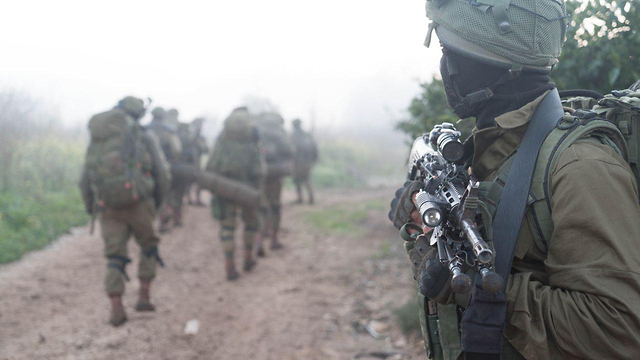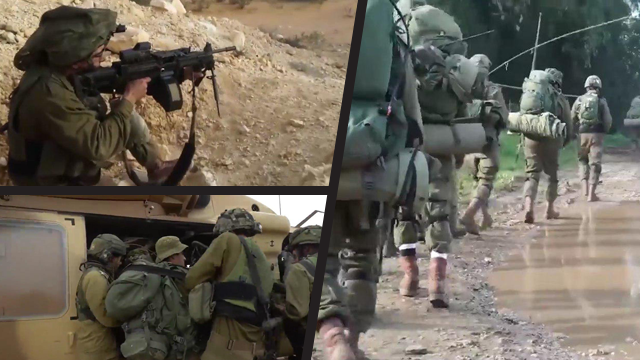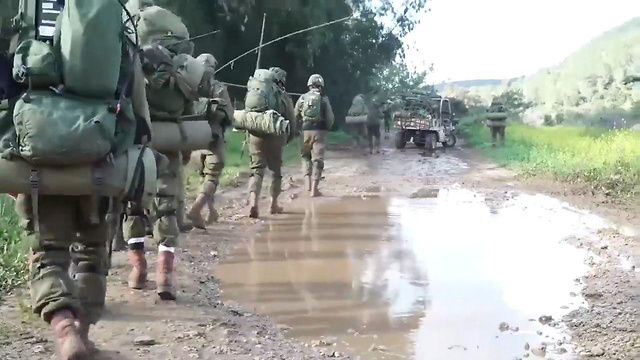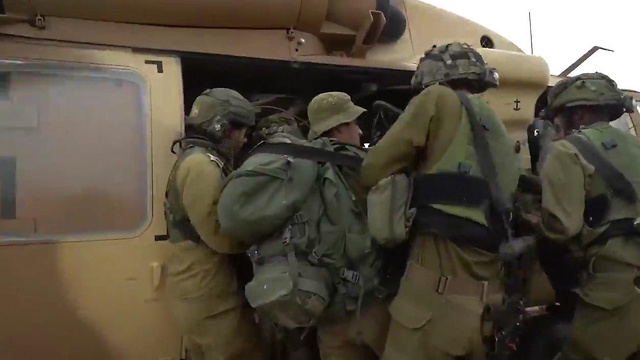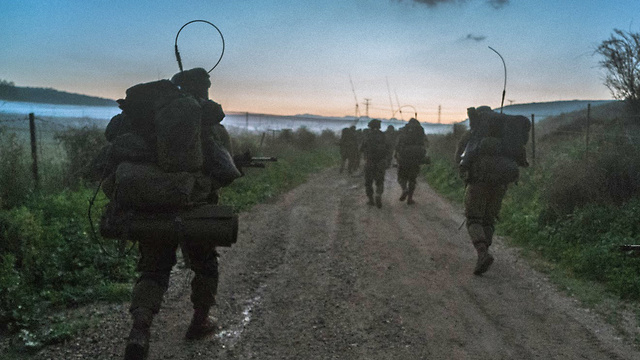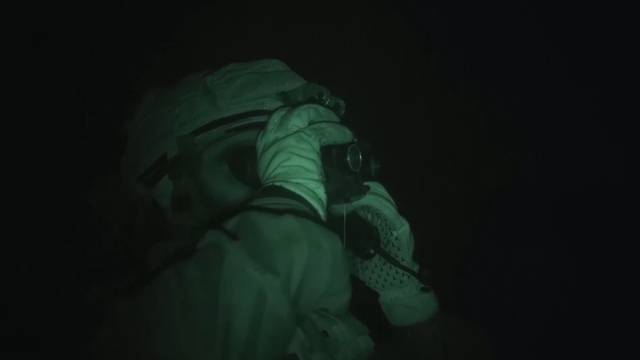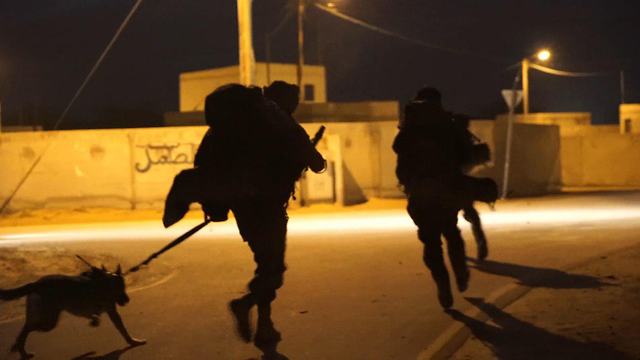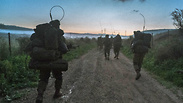

Paratroopers prepare for full self-reliance in Lebanon war scenario
Amid the rugged Mt. Carmel forests, troops learn to make use of food, fuel, medical supplies from Lebanese population, fix weapons mid-battle; Fact that Hezbollah is now a more professional, conventional, highly trained army, not militia, seen as advantage for IDF.
A commando force of the 101st Paratrooper Battalion "Elapidae" is making its way through the night by the light of the moon towards a Hezbollah command center. They engage in a close-range gun fight and sustain injuries, but they succeed in their mission and capture the target with its precious contents: Hezbollah intelligence and operational data.
They are deep in enemy territory and their supply of food and ammunition can last until the next morning, but they may have to stay behind enemy lines for days or even weeks and aerial supply options are limited.
The above scenario is what the IDF Paratrooper Brigade has recently been training for. At first, they trained in the south, in preparation for a Gaza campaign, and then in the north, in preparation for a two-front campaign.
Although the soldiers train and practice military maneuvers from morning to night during basic and advanced training, it is the mental and logistical challenges that can prove decisive in the event of a war in Lebanon.
The assumption is that Hezbollah's best units are positioned in south Lebanon, at the front line. For that, the IDF will send a vicious wave of fighting infantry units together with tanks, armored personal carriers (APCs) and D9 bulldozers assisted by artillery.
Hezbollah units' return from the Syrian civil war, bloodied but battle tested and with renewed confidence, together with the recent exchange of warnings between Israel and the Shiite militia, highlight the extent of battle readiness in the north.
The Paratrooper Brigade has carried out a number of large scale parachute exercises in the past few years—and not just to justify their name. The brigade's recent training missions included massive amounts of heavy, live munitions, dropped by F-16s near the ground forces.
They trained in the woodlands of Mt. Carmel as its topography and foliage is very similar to that of south Lebanon.
A combat pilot who participated in the drills said: "We opened an air command center for the joint operations unit to oversee and synchronize operations. Despite the wintery weather, we provided the ground forces with full air support including evacuation of the wounded."
Anticipating the difficulties in resupplying troops, the battalion's intelligence platoons is also studying more mundane details: The locations of gas stations, for fuel, as well as local pharmacies.
"The goal is to advance as secretly and quietly as possible," explained Capt Yanun Lavian, a 101st battalion company commander, to Ynet. "No matter how little food, water and sleep you have, you need to be able to make do with what's available and be fully energized, mentally and operationally. In south Lebanon, the rules are different."
Combat units need to be independent and the details differ by level of command. "A battalion commander must think of how to move large amounts of troops and equipment to a certain place; and a company commander has to consider how to feed his troops each day; while an individual soldier must consider from whence the enemy will appear," he continued.
We know the next war will be different
To optimally illustrate what awaits the soldiers in battle, as part of the exercise, food was hidden among homes that are under construction, and which were captured by the forces, in the Druze town of Daliyat al-Karmel.
They opened cabinets and discovered fruits and vegetables, oil, rice and canned food, which they cooked for themselves. "They added chlorine tablets to the water so they can drink it and fill up their bottles for the road ahead," one of the officers recounted.
Troops also found gas stations which they made use of. One structure representing a Lebanese pharmacy and medical supplies store was left for the troops to find. "The name of the game there is self-reliance," said the officer.
The brigade's senior officer said there was room for improvement. "We analyze reports debriefings from the 1982 Lebanon War, but we know this time it will be different. We are without tanks; we only have what we carry on our backs."
In addition to learning how to subsist on local food and water, some soldiers underwent instruction in how to care for and fix the battalion's weapons, and in the case they come across the enemy's weapons cache, the soldiers learnt how to operate Kalashnikov rifles as well.
In one exercise, paratroopers, alongside the elite Unit 669, practiced rescuing a downed pilot while Hezbollah attempted to capture him. Urgent medical care lasting 12 hours or more, until a rescue helicopter could come, is an entirely realistic scenario.
"We are practical in our training," said one senior officer. "The real scenario is far from anyone's imagination. Mental strength is essential in fighting deep in southern Lebanon. A combat soldier understands that much is asked of him and that the Hezbollah forces he is facing may be larger or more heavily armed than he might expect."
The terminology being used has changed. IDF officers are calling Hezbollah an army and not merely a guerilla organization. "Hezbollah has been strengthened, they take more initiative and are more capable than before… The possibility that the Lebanese army will fight alongside Hezbollah is also taken into consideration," said an officer.
Two years ago, a senior officer of the northern command described Hezbollah as the strongest military in the Middle East after Israel. For the Paratrooper company commanders, that is a good thing. They are on their way to becoming a conventional army and the IDF brass believes that no conventional army in the region can beat the Israeli army.
In battle against an unconventional force, there are unique challenges that change the rules of the game. But the fact that Hezbollah has gained a lot of experience (in Iraq and Syria) serves the interests of the IDF.
"We are preparing the soldiers for a lot of uncertainty and for the long haul. The main difference regarding combat deep in southern Lebanon is the factor of self reliance. We are going to fight a professional army that has been tried and tested on various combat fronts during the past few years," said Major Gal Carmi of the 101st Battalion.














